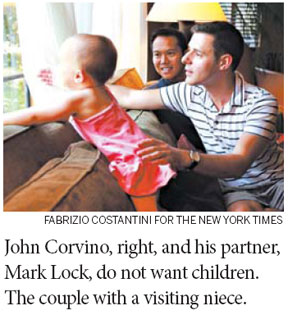Gays feel pressure to parent
WASHINGTON - When the jubilant couple were wed in June, they exchanged personalized vows and titanium rings, cheered the heartfelt toasts and danced themselves breathless. Then, as the evening was winding down, unexpected questions started popping up. Their guests began asking: Are you going to have kids? When are you going to have kids?

Tom Lotito and Matt Hay, both 26, could not help but feel moved. They never imagined as teenagers that they would ever get married, much less that friends and family members would pester them about having children.
"It's another way that I feel like what we have is valid in the eyes of other people," said Mr. Hay.
As lawmakers and courts expand the legal definition of the American family, same-sex couples are beginning to feel the same what-about-children pressure that heterosexual twosomes have felt.
Many gay men had resigned themselves to the idea that they would never be accepted by society as loving parents and assumed they would never have children. They grieved that loss and moved on. So the questions can unearth bittersweet feelings and cause deep divisions within a couple over whether to have children at all, now that parenting among same-sex couples is becoming more common.
The process can be also daunting logistically and financially, as would-be parents wrestle with whether to adopt or use a surrogate. And once they have children, many same-sex couples still endure the inevitable criticism - spoken or unspoken - from those who remain uncomfortable with the notion of their being parents.
But support for same-sex parents is growing steadily among Americans. A Pew Research Center survey conducted in July and released in early August found that 52 percent of people surveyed said that gay men and lesbians should be allowed to adopt children, up from 46 percent in 2008 and 38 percent in 1999.
Greg Moore, 62, a retired corporate manager in Fort Lauderdale, Florida, shakes his head with wonder when he sees young male couples chattering about their toddlers. That possibility seemed hopelessly out of reach when he and his 74-year-old husband, who have been together for 44 years and married in 2008, dreamed of having children. "Gay people didn't have kids," he said wistfully. "Straight people had kids."
Popular culture is helping rewrite that script. Gay men who have children, or are considering having children, are becoming increasingly visible on network television in the United States.
The shift is reflected in census data. Between 2000 and 2010, among same-sex couples raising children, the percentage of couples with adopted children rose to 20 percent from 9 percent, according to an analysis by Gary Gates, a demographer at the Williams Institute at the University of California, Los Angeles. (Most same-sex couples with adopted children are lesbians, but gay men make up a growing share, accounting for nearly a third of such couples in 2010, up from a fifth in 2000.)
"The definition of family is unquestionably evolving," Dr. Gates said.
But same-sex couples are prohibited from adopting in Utah and Mississippi, and they face legal hurdles in about half of all other states, particularly because they cannot legally marry in those states. And some religious leaders have refused to provide adoption services to gay couples. Roman Catholic bishops in Washington, D.C., Illinois and Massachusetts have shuttered adoption services rather than comply with requirements that they consider same-sex couples as adoptive parents.
For Jeff Krehely, 35, who has been married for six years, there is no escaping the question. His friends ask. His colleagues ask. His parents are so eager that they have taken to sending birthday cards to his two cats (they call them the "grandkitties").
"Everyone's asking: What's your timetable? What's your plan?" said Mr. Krehely, a policy analyst, who is still weighing whether to have children.
Rudolph Chandler, 57, and George Walker, 43, who married in 2010, thought long and hard before they decided against having children. They say they admire their friends who are parents. But, these days, they are asked so often about their child-rearing plans that they roll their eyes when it comes up. "It's irritating, tiring," said Mr. Chandler, a health economist.
John Corvino, 43, chairman of the philosophy department at Wayne State University in Detroit, Michigan, has even come up with a standard response that he leavens with a dash of humor when asked whether he wants children: "To shovel the snow and mow the lawn, sure," he says. "Beyond that, no."
The New York Times


















